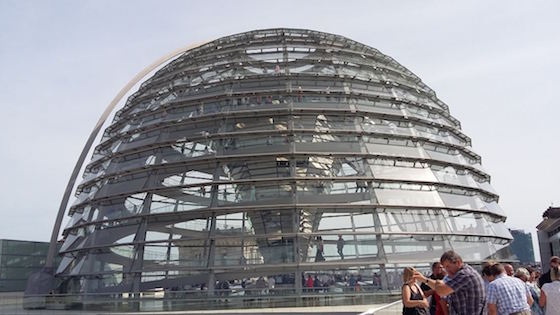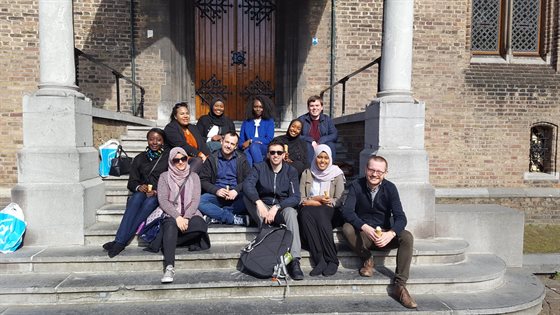Politics and
International Relations students from De Montfort University Leicester (DMU) got the chance to meet German parliamentarians and polled voters about the country’s important upcoming election as part of the university’s grand trip to Berlin this month.

Students from DMU’s Business and Law (BAL) faculty were among the more than 800 students and staff who travelled to Berlin between June 12th-16th in what was one of the biggest European trips ever carried out by a UK university.
To augment the studies undertaken on their course, the DMU politics students were given tours of fascinating sites in the German capital to learn more about the politics of the Cold War era as well as the contemporary political landscape of this powerful European country.
Led by Chris Goldsmith, DMU’s Senior Lecturer in International Relations, the students were given guided tours of the The Alliierten Museum as well as the Berlin Wall Memorial Museum on Tuesday, June 13.
The Alliierten (‘Allied’) Museum documents how enemies became friends after the German defeat in the Second World War and how Berlin became one of the most important scenes of the struggles that go down in history as the Cold War. The students spent more than three hours at the museum and learn about the shifting tides of international relations during these turbulent times.

The Berlin Wall Memorial is the central memorial site of Germany’s division into East and West Germany (1945-1990). It extends along 1.4km of the former border strip and contains the last piece of Berlin Wall with preserved grounds behind it so visitors are able to get an impression of how the fortification developed until the end of the 1980s. The events that took place there, together with the preserved historical remnants and traces of border obstacles on display, helped the students to comprehend the history of Germany's partition.
In the early evening the students then listened to debates at the A&O Mitte Hotel surrounding Germany’s views on Brexit with Josef Janning, the head of the Berlin office of the German Council of Foreign Relations and a senior policy fellow with the organisation.
Later in the week, Mr Goldsmith led the politics students on two further trips to fascinating historic sites. On the morning of Thursday, June 15th, they spent time at BlackBox Berlin – the Cold War Museum at Checkpoint Charlie in Friedrichstrasse, while in the afternoon, they spent several hours looking around the Ruschestraße, the museum chronicling the history of the repressive Stasi secret police agency.
RELATED NEWS:*
Visit our Berlin page to find out all about the trip*
Human rights and international relations in the spotlight in Berlin*
German spy museum offers up its secrets to studentsThe BlackBox museum explores the Cold War period, when the East-West conflict dominated the international political scene. The students learned about the tensions that played out between the Eastern Bloc, under the leadership of the Soviet Union, and the West, led by the United States, especially in Germany and Europe. Their guide, Andreas, showed the students artefacts found after the fall of the Wall.
The notorious Checkpoint Charlie was was the name given to the best-known Berlin Wall crossing point between East and West Berlin and was the scene of an infamous stand-off between Soviet and US tanks in October 1961.
In the afternoon, the students explored the Ruschestraße, based at the former grounds of the headquarters of the German Democratic Republic’s Ministry for State Security in what was then East Berlin. The students learned about the development, function and methods of the Stasi and how the rulers created a system of power based on force, threats, rewards and privilege.
Moving on to matters affecting the German political landscape today, DMU senior politics lecturer Dr Alison Statham led a tour of the Abgeordnetenhaus, the state parliament of Berlin, on Thursday, June 15.
The students got the chance to see the building’s plenary chamber where full debates are held and they got privileged access to Berlin regional MPs, including meeting Christian Democratic Union (CDU) politician Christian Goiny, a member of the country’s House of Representatives and a media spokesman. A veteran of Berlin’s political scene, the former lawyer has served on several committees and from 1995 to 2001 was the chairman of the CDU parliamentary group in the borough of Steglitz-Zehlendorf. Later that afternoon, they visited the impressive terrace and dome of Germany’s parliament building, the Reichstag.
On Friday, June 16, the students were given a walking tour of Berlin’s parliamentary district with experienced guide Jan Benedict Werner which took in the southern gatehouse of the historic Brandenburg Gate. In the afternoon, groups of students visited either Berlin Zoo or the Alexanderplatz public plaza where they carried out a survey of Berliner’s voting intentions ahead of the pivotal German general election on September 24.
BAL students also took in other world-famous landmarks while in Berlin such as the Reichstag and the Sachsenhausen Concentration Camp Memorial.
DMU’s conference event at the British Embassy at the heart of the city on Wednesday, June 14, where Vice-Chancellor Professor Dominic Shellard was joined by Britain’s Ambassador to Germany, Sir Sebastian Wood, was also attended by BAL students and staff. They heard speeches on the uncertainties and possibilities in British politics and the importance of building and maintaining connections across Europe.
Posted on Friday 23 June 2017